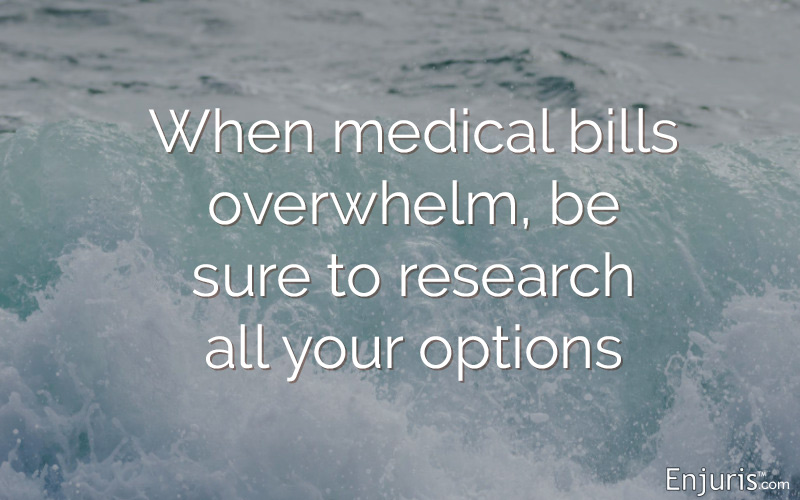What are your financial options in Colorado to cover the cost of your injuries?
Being injured in an accident is always extremely upsetting and stressful and it can be even worse if the accident was the fault of another party. Even if you win compensation later in a claim or lawsuit, that's down the road, right?
So who pays for your medical bills right now? How do you pay your bills if you cannot work? How do you make ends meet?
The purpose of this article is to answer these pressing financial questions if you have been in an accident in Colorado.
Fortunately, there have been changes to Colorado accident laws that make getting your bills paid easier. We'll go through some of the options according to the type of accident you've had.
There also are medical bill assistance programs in Colorado that we detail later in this article. You are not alone!
If it was a car accident
Colorado was a 'no-fault' state, but this was changed in 2003. Colorado is now a 'fault insurance state'.
Today, injured drivers and passengers have several options to obtain compensation for getting their medical and property damage bills paid after an accident:
- File a claim on your own car insurance
- File a claim on the at-fault driver's policy
- Go to court and file suit against the at-fault driver, seeking compensation for your damages
The good news is that if you decide to file the claim with your insurance company, you can get your bills paid more quickly. Your insurance company can be reimbursed later by the other party's insurance company if it is determined that he or she was at fault.
This probably will be a huge relief to you if you were worrying about getting your medical bills paid right after a car accident.
Colorado insurance requirements for minimum liability
Drivers in Colorado are required to insure all vehicles with the following coverage, at minimum:
- $25,000 for each person for any bodily injuries.
- $50,000 for each accident if 1+ person is injured.
- $15,000 for each accident for damage to property. This is not including damage to the insured's vehicle.
This mandatory minimum coverage goes into effect if another driver files an accident claim or lawsuit that claims you caused an accident.
You also can use your own health insurance to pay your bills at first. Then, you can pursue repayment from the other driver's insurance company later.
Also, Colorado mandates that auto insurers offer $5,000 in medical payment coverage. This also is called ‘med pay' coverage. Drivers may decline it if they choose. If they do nothing, the med pay coverage is added to the policy.
This coverage is not required, but if you have it, med pay provides limited funds for anyone hurt in a Colorado car accident – regardless of fault. You should check if you have this extra coverage – that extra $5,000 could come in handy just about now!
Underinsured and uninsured coverage not required in Colorado
Colorado has no requirement for drivers to carry uninsured and underinsured motorist coverage. This coverage would apply if you are in an accident with an at-fault driver who has no car insurance, or has insurance that will not cover your injuries and property damage.
Slip and fall cases in Colorado
In a slip and fall case – also known as premises liability – you as the injured party usually are responsible for paying your medical bills.
The exception is if the owner of the property has ‘med pay' coverage. If so, then the insurance policy will pay for your medical bills, up to the policy limits. After that, you are responsible for paying your bills.
Boating accidents in Colorado
Boating insurance policies seldom have ‘med pay' coverage. If you are hurt in a boating accident, you probably will have to pay for your medical bills.
Work accident in Colorado
If you are hurt on the job, workers' compensation should cover all of your medical bills. You should have no medical bills or deductibles at all. However, workers' comp does not provide for pain and suffering.
See the Colorado Department of Labor and Employment for injured workers' information.
Reimbursement for insurers
If a health insurer such as Medicare or a state agency pays for your medical bills related to your accident, they are entitled to reimbursement after the accident case settles.
Other options to cover medical expenses
You may still have medical bills that are not covered by the above options. You see weeks or months of medical costs in front of you and are not sure what to do. Now what?
Did you know your attorney could help with bills?
If you are being slammed with medical bills that you cannot pay, talk to your personal injury attorney. The attorney can act on your behalf by calling your doctors. She can make financial arrangements on your behalf so that some bills may be delayed until the case is settled.
This is where having a good Colorado personal injury attorney will pay in spades. This can prevent bills from going to collections and destroying your credit.
Talk to your medical providers yourself
If you decided to not get an attorney, you may be able to negotiate smaller payments on your own. Tell them that you are working on settling a claim. For now, try to get the health care provider to take small installments.
Check for financial assistance plans
You may be able to find local assistance programs in Colorado. Also try Medicaid, the state's health insurance plan for children, and financial aid from the hospital.
The Colorado Department of Human Services can help individuals and families in an emergency. Having medical bills you cannot pay due to an accident that was not your fault might qualify for assistance.
There are also programs to help with child care and support, disability, employment, paying for energy costs, food assistance, refugee assistance, vocational and employment help and temporary assistance for needy families.
To apply for these benefits, visit PEAK, the online service for Coloradans to screen and apply for these medical, food, cash and child care assistance programs. For help with an application, call 1-800-536-5298 Monday - Friday from 8:00 a.m. to 5:00 p.m. (closed on holidays).
The Colorado state government website also lists many organizations that may be able to provide financial assistance for your medical bills.
Also try the Colorado Consumer Health Initiative, which provides information on potential resources for people with large hospital bills that they cannot pay.
You may also find websites such as needhelppayingbills.com, which list resources and even forums where you can ask for help.
In the end, don't underestimate the help an attorney can bring at this time. It may extend beyond legal representation, helping you get back on your feet after your accident.
If you aren't sure where to start to hire an attorney, learn how to select a good Colorado personal injury attorney here.
See our guide Choosing a personal injury attorney.


